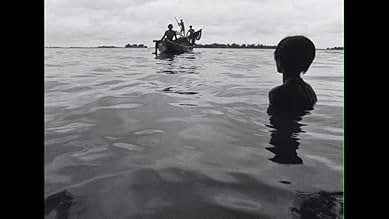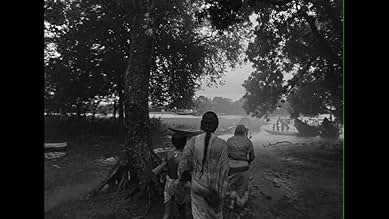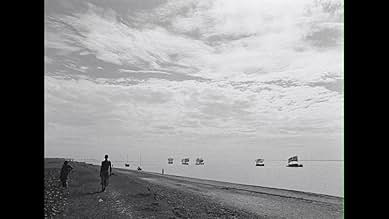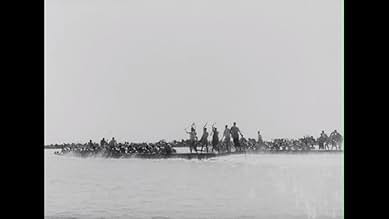IMDb RATING
7.2/10
1.5K
YOUR RATING
After their wedding night, a fisherman's young wife is kidnapped on the Titas River in Brahmanbaria, Bangladesh.After their wedding night, a fisherman's young wife is kidnapped on the Titas River in Brahmanbaria, Bangladesh.After their wedding night, a fisherman's young wife is kidnapped on the Titas River in Brahmanbaria, Bangladesh.
- Director
- Writers
- Stars
- Director
- Writers
- All cast & crew
- Production, box office & more at IMDbPro
Featured reviews
This film by somewhat neglected Indian director Ritwik Ghatak is one of the most unusual I have ever seen. The stories are set among the harsh life around the banks of Bangladesh's rivers (one of the poorest regions of the world). It tells several gruesome tales: abductions, escapes, living among strangers, death, though the characters go through this with the resignation of someone who knows that life is hard and always have been. Now, having seen this film more than a decade ago, I cannot recall all the details. But the unusual part is the way this story is told. It puts a character at the center of the story for, say, twenty minutes, and then it moves to another character, who was playing a minor role in the first story. And then to another character, and so on. It is a collection of stories, but loosely (or not so loosely interconnected). Overall, a fine tapestry of life in one of the poorest parts of the world.
Again an uneatable work by Ghatak.At least for the Westerner, who does not have much of a clue about Hindouistic mythology and the life style of the Bengali people. Confusing. Contains scenes where someone tells short stories. Deterrent for good film making. Hitchcock would have not liked.
I tried to remember pieces of seeming senseless conversation parts. I could for one: "I knew a man who could recite the whole Mahabharata ..." Would you embrace and be impressed by a Western film wherein you hear someone stating: "I know a man who knows the whole Bible by heart"?
These may be cultural relativity. But filmmaking should not be dependent so much on it, especially its technical aspects. I have hardly ever seen a worse photography, a worse soundtrack. When the scenery consists of a talking group of people, we see them occupying the lower third of the frame, the lower limb cut off. About half of the frame is filled by the sky! No sort of surrealism or experimentation or exxageration.
The sound in the mostly open air, natural village background sounds shouting like if recorded in a narrow hall.
I tried to remember pieces of seeming senseless conversation parts. I could for one: "I knew a man who could recite the whole Mahabharata ..." Would you embrace and be impressed by a Western film wherein you hear someone stating: "I know a man who knows the whole Bible by heart"?
These may be cultural relativity. But filmmaking should not be dependent so much on it, especially its technical aspects. I have hardly ever seen a worse photography, a worse soundtrack. When the scenery consists of a talking group of people, we see them occupying the lower third of the frame, the lower limb cut off. About half of the frame is filled by the sky! No sort of surrealism or experimentation or exxageration.
The sound in the mostly open air, natural village background sounds shouting like if recorded in a narrow hall.
"I miss my daughter. She left yesterday. My last dear one. She was all I had. My only daughter. That's the way it happens. It all comes and then disappears again. There's a spark of life. And suddenly it's not there. It all becomes untraceable. You were a child yesterday. Today you're a woman. This ever-flowing river Titas may become bone dry tomorrow. It may not even have the last drop without which our soul cannot depart. Yet these flocks of sails move on and on and on..."
Taken at face value, this film comes across as a long melodrama, and a pretty damn contrived one at that. A couple of young men go out fishing with their uncle, and in a chance encounter with a young woman in another village, one of them gets married. It's pretty odd, as they don't know each other's names, barely speak, and yet consummate what amounts to an agreement for an actual ceremony back in his village. On their way back home, however, they're set upon by bandits and she ends up overboard.
It's interesting (and a little depressing) to see how women are treated early on here - when they discover the woman gone, the reaction of the men is to shot they've been robbed, as if she's a material possession. Meanwhile, back at home the groom had a young girl waiting for him - and I do mean young; she's told by her uncle that she's a "woman now" but looks about 10. However, there is a strong woman character who emerges later in the film, one who stands up for herself and amidst great hardship says that there is only one true thing in life, and that's motherhood.
Back to the story. The man goes crazy literally that night for fear his wife has drowned - even though he was just telling his buddy he didn't even know what she looked like, and certainly hasn't formed deep feelings for her. And it turns out the woman survives and is picked up by benevolent strangers, but the next we see of her we've fast forwarded ten years. The only thing she knew about her husband was the name of his village, and she has a child, having conceived on her "wedding night." She makes her way to this village (why only now, we don't know), and throws herself on the mercy of the villagers. The woman who takes her in is the one who had loved her husband. She got married to his buddy instead, but the buddy died, so she's a young, childless widow herself.
Now how the villagers aren't able to connect the dots and realize that this new arrival and the "crazy man" living among them were the ones who had married years ago is a mystery, and it's also odd that the woman doesn't recognize the man, even though he's all disheveled and years have passed. She's attracted to him nonetheless but tragedy strikes in a way I won't describe, leaving their son an orphan. He's cared for by the same family that took them in, but the woman's mother looks at him as her mortal enemy since he's not kin and consumes food. He has visions of his dead mother as a goddess, but his real life is very sad. The plot follows the boy and his adoptive mother (or "auntie") from there and continues its quick pace for dramatic turns of events in the second half (yes all of what I described happens in the just the first half).
While the plot is sprawling and a bit of a mess, the film is undoubtedly a parable for something higher. At its heart it seemed to be about loss, forms of which happen to many characters through fate, or man's cruelty to man. Just as the rain pours down on this river (it's a very wet film!), life pours down on people, if I can use such a cliché analogy. In our better natures, we help others and are compassionate, and in our worse natures, we're selfish and unkind. The film is about life and carrying on despite the struggle, even though ultimately everything we cherish will eventually pass away - even big things that seem so permanent, like rivers. That's alluded to in the first ten minutes with the quote at the top of this review, and there's something deep at the film's center that I appreciated. I only wish it worked as well on a literal level.
The caliber of filmmaking is high, with beautiful black and white cinematography that transported me to this time and place. Attention is paid to sound, such as the heavy breathing of anxiety from the young woman before being taken to bed by her husband on their wedding night. The performance from Rosy Afsari stands out in a pretty solid cast. All of the ingredients are there, and with the deeper meaning it was a near miss for a higher rating.
Taken at face value, this film comes across as a long melodrama, and a pretty damn contrived one at that. A couple of young men go out fishing with their uncle, and in a chance encounter with a young woman in another village, one of them gets married. It's pretty odd, as they don't know each other's names, barely speak, and yet consummate what amounts to an agreement for an actual ceremony back in his village. On their way back home, however, they're set upon by bandits and she ends up overboard.
It's interesting (and a little depressing) to see how women are treated early on here - when they discover the woman gone, the reaction of the men is to shot they've been robbed, as if she's a material possession. Meanwhile, back at home the groom had a young girl waiting for him - and I do mean young; she's told by her uncle that she's a "woman now" but looks about 10. However, there is a strong woman character who emerges later in the film, one who stands up for herself and amidst great hardship says that there is only one true thing in life, and that's motherhood.
Back to the story. The man goes crazy literally that night for fear his wife has drowned - even though he was just telling his buddy he didn't even know what she looked like, and certainly hasn't formed deep feelings for her. And it turns out the woman survives and is picked up by benevolent strangers, but the next we see of her we've fast forwarded ten years. The only thing she knew about her husband was the name of his village, and she has a child, having conceived on her "wedding night." She makes her way to this village (why only now, we don't know), and throws herself on the mercy of the villagers. The woman who takes her in is the one who had loved her husband. She got married to his buddy instead, but the buddy died, so she's a young, childless widow herself.
Now how the villagers aren't able to connect the dots and realize that this new arrival and the "crazy man" living among them were the ones who had married years ago is a mystery, and it's also odd that the woman doesn't recognize the man, even though he's all disheveled and years have passed. She's attracted to him nonetheless but tragedy strikes in a way I won't describe, leaving their son an orphan. He's cared for by the same family that took them in, but the woman's mother looks at him as her mortal enemy since he's not kin and consumes food. He has visions of his dead mother as a goddess, but his real life is very sad. The plot follows the boy and his adoptive mother (or "auntie") from there and continues its quick pace for dramatic turns of events in the second half (yes all of what I described happens in the just the first half).
While the plot is sprawling and a bit of a mess, the film is undoubtedly a parable for something higher. At its heart it seemed to be about loss, forms of which happen to many characters through fate, or man's cruelty to man. Just as the rain pours down on this river (it's a very wet film!), life pours down on people, if I can use such a cliché analogy. In our better natures, we help others and are compassionate, and in our worse natures, we're selfish and unkind. The film is about life and carrying on despite the struggle, even though ultimately everything we cherish will eventually pass away - even big things that seem so permanent, like rivers. That's alluded to in the first ten minutes with the quote at the top of this review, and there's something deep at the film's center that I appreciated. I only wish it worked as well on a literal level.
The caliber of filmmaking is high, with beautiful black and white cinematography that transported me to this time and place. Attention is paid to sound, such as the heavy breathing of anxiety from the young woman before being taken to bed by her husband on their wedding night. The performance from Rosy Afsari stands out in a pretty solid cast. All of the ingredients are there, and with the deeper meaning it was a near miss for a higher rating.
The storytelling here is segmented and leans heavily on symbolism, but the acting is distractingly poor. It is difficult to stomach the dialogue, but that may be a translation/captioning issue.
Typically for Indian movies this has it all, evil capitalists that destroy the property of the poor peasants, a man struck insane by the abduction of his newly-wed wife from arranged marriage, compassionate families that end up turning against the one they help and a lot of smoking from water pipes and chewing of betel nut.
The film starts by announcing that not many people know about and much less care about the people living in this region which is one of the world's poorest places. And by the end of it most things look very unfortunate for them still. It is realistically made, shot on location so that doesn't feel contrived. That being said, some of the acting looks funny and artificial by our standards. As we move focal points also it can be a little difficult to follow the numerous plots.
Antropologically interesting too.
The film starts by announcing that not many people know about and much less care about the people living in this region which is one of the world's poorest places. And by the end of it most things look very unfortunate for them still. It is realistically made, shot on location so that doesn't feel contrived. That being said, some of the acting looks funny and artificial by our standards. As we move focal points also it can be a little difficult to follow the numerous plots.
Antropologically interesting too.
Did you know
- TriviaDirector Ghatak appears in the film as a boatman, and Basanti's story is the first of several melodramatic tales.
- Quotes
Ramprasad: That's the way it happens. It all comes and then disappears again. There's a spark of life. And suddenly it's not there. It all becomes untraceable. You were a child yesterday. Today, you're a woman. This ever-flowing river Titas may become bone dry tomorrow. It may not even have the last drop without which our soul cannot depart. Yet these flocks of sails move on and on and on...
Details
- Release date
- Country of origin
- Official site
- Language
- Also known as
- A River Called Titas
- Production company
- See more company credits at IMDbPro
- Runtime
- 2h 39m(159 min)
- Color
- Sound mix
- Aspect ratio
- 1.37 : 1
Contribute to this page
Suggest an edit or add missing content


























